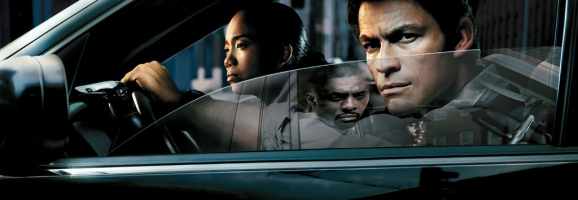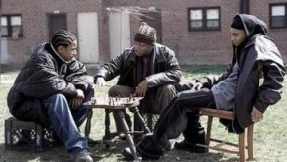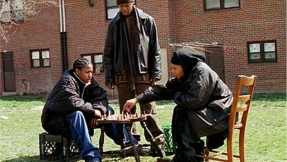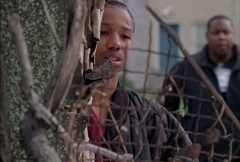“The Wire,” Chess, and Urbanity: Deconstructing Hegemonic Ideas of Urban Culture

There’s a reason many people consider The Wire to be one of the greatest TV shows of all time. Very few shows have delved so deeply and truthfully into the conflicted lives of law enforcement, drug dealers, and gang bangers. The realistic, and novelistic, quality of The Wire easily transports the viewer to the inner city streets of Baltimore, Maryland, through its spectacularly detailed storytelling, and you feel as if you become a character within the show. And the unparalleled writing makes you feel as if you know each character on a personal level, thus making the audience emotionally attached to characters whom they would not normally care for at all. (If you haven’t seen the show, do yourself a favor, buy the DVDs, and watch it now!) The Wire takes us inside a world foreign to most of us, that is, the world of drugs in the inner city. The Wire has an amazing ability to get the viewer to question their own humanity and their own realities. We go in watching the show with preconceived notions of what we expect certain characters to be like. Then, The Wire takes everything we think we know and molds it into something completely different. We begin to empathize and hurt for some of the “bad guys” and become frustrated and loathe the actions of some of the “good guys.” There is no black and white in The Wire. And with this, The Wire so brilliantly deconstructs dominant ideas that we, as a society, have about those who are perceived to be lesser beings for one reason or another.
“Lowlife,” “violent thug,” “uneducated,” “deserving of the bad things that come their way”—these are just a few hegemonic ideas the dominant social group has attached to urban persons, especially those in the drug game. Defined as “a way of life and thought that is dominant in society to the point that it seems natural” (O’Donnell, 2013), these ideas of urban culture have become just what the definition says—naturalized. If certain negative stereotypes become the hegemonic norm, it becomes important to break them down whenever possible, and that is exactly what The Wire does. Presenting young, black, urban drug dealers, The Wire has the ability to take these normalized ideas and counter them with representations of intelligent youth doing what they know in a world in which they were born. We are opened up to their struggles on a day-to-day basis and become more astutely aware of the lack of options they have and the hardships they face. As I said earlier, we find ourselves being able to sympathize with these social “others” as we see their desire to want out of their almost predestined class but come to understand their reality of lack of economic mobility. Perhaps no better scene of The Wire displays this counterhegemonic portrayal of urban life than when D’Angelo teaches Bodie and Wallace chess in the episode “The Buys” (2002).
In “The Buys,” D’Angelo Barksdale, a mid-level drug dealer who is the nephew of the head of the Barksdale drug trade, walks through The Pit and encounters two Barksdale underlings playing checkers with chess pieces because they do not know how to play chess. D’Angelo sits with them and instructs them on the rules of chess and how to play.

After a few brief moments, both Bodie and Wallace are receptive to D’Angelo’s teachings. He breaks down the rules of the game in language familiar to Bodie and Wallace by explaining it in allegorical terms related to their lives in the drug game. Right away, we see a level of intelligence and education in this scene that breaks down the hegemonic idea of uneducated as it relates to black, urban youths. D’Angelo is intelligent enough to know the rules of an extremely strategic game like chess and have the ability to convey those rules in an instructional manner to people who do not know the rules. Bodie and Wallace show that they care about education because they are receptive to the things D’Angelo is telling them and ask questions so as to fully understand everything that is being taught to them.
If we examine the more allegorical side of D’Angelo’s rule explanation, we can also see how the three display intelligence as it relates to their jobs within the drug game. D’Angelo accurately describes the varying positions and levels within the drug game using the chess pieces as examples (e.g., the king representing the leader of the drug trade or the rook representing the way the stash moves from safe house to safe house). Wallace and Bodie, at first, push back on some of D’Angelo’s allegories, but they concede to D’Angelo’s comparisons. Both establish their place at the bottom of the hierarchy but also as two people who ultimately understand the ins and outs of their profession. Maybe it is somewhat morally flexible to praise their occupational intelligence since they sell drugs. However, it is important to remember that in the drug game you can be killed at any moment, so we can praise their intellect in their strivings for survival and as worthy adversaries in out-strategizing their opponents.
The education in the form of the chess game that D’Angelo is imparting to Wallace and Bodie also deconstructs the hegemonic idea that persons in this urban environment are always violent. Bonjean (2009) notes how “the code [of the drug business] revolves around the presentation of self. Its basic requirement is the display of a certain predisposition to violence” (p. 166). This display of violence is often seen in the typical “education” that takes place in The Pit. Many times, the drug game education that occurs in The Pit is attacking a customer for shortchanging the dealer or something of the like. However, D’Angelo shows that their lives do not always revolve around violence by educating them through a very non-violent game of chess. There is also a subliminal teaching message from D’Angelo to Bodie that drug education does not always have to be violent, as Bodie is frequently the main aggressor in the violent attacks that occur in The Pit.

way as to distinguish a hierarchy within the Barksdale crew
This scene also introduces elements of social class. The dominant, hegemonic idea of people in this urban society is that they are very poor and have simply resigned themselves to their fates and therefore do nothing to try to improve their lives. Both of these ideas are undercut during this scene. D’Angelo wears designer clothing and has the money to keep up appearances. He is dressed more finely than the other two. Also within the scene, Bodie verbalizes his ambitions of being “top dog” while being taught chess. He currently accepts his place as a pawn but we understand he has ambitions to move up in the game. The sad fact for Bodie—and Wallace—as a pawn in the game is that, as D’Angelo puts it, “the pawns, they get capped quick.” We can see how the scene visually displays the class difference. The three young men are triangulated in a way as to represent a division between them. D’Angelo is in the center and standing above the other two, creating the top of the triangle. Wallace and Bodie form the left and right corners, respectively, of the triangle—the base. They are on the bottom both visually and in the Barksdale crew. The triangle reifies Bodie’s and Wallace’s place in the game as pawns and D’Angelo’s place in the game as a knight or bishop, mainly because of his familial connection to the allegorical king of the Barksdale crew.
As the scene progresses, we begin to sympathize more and more with them and their position in life. This goes against the hegemonic idea that these urban drug dealers are not worthy of our sympathy. As I mentioned earlier, we can see Bodie’s desire to move up the ladder, but we can easily figure that it is a farfetched dream. Because Bodie is a pawn, not only is he likely to get “capped quick,” as D’Angelo says, because the pawns are the soldiers and on the frontlines, but the pawns, in both chess and the drug game, are also the most likely to be sacrificed for the betterment and safety for those that are more important. In the social economy, urban youth have very few job options compared to non-urban youth, and the job options available to them offer them very little pay and almost absolutely no mobility, so sometimes their only option is to turn to the economy that is right in their backyard, and that is the drug economy (Anderson, 1999). But as we see in the chess scene, even the drug world offers very little hope for mobility for the pawns. According to Anderson (2012), “[D’Angelo’s] chess allegory gestures toward an expanded perspective on their precarious lives” (p. 85). While we immediately understand this in relation to their precarious lives within the drug game, we can also apply this to their precarious lives outside of it as well. With little mobility in either a legal or illegal trade, it is difficult to know just exactly what to do when, regardless, you are in a constantly precarious situation.

We also feel sympathy for someone like Wallace. He is a fourteen-year-old who has dropped out of school and decided to get into the drug game. According to hegemonic standards, we should have nothing but apathy and disgust for someone like him—someone who has chosen to ruin his young life by going the route he has gone. But what is not immediately apparent is his backstory. At one point in the series, we are made aware that Wallace has neither a mother nor a father that are in the picture. Not only that, but he is singlehandedly caring for a number of younger siblings by himself, at the age of fourteen. He has to make sure they get off to school, have something to eat, have at least a couple different outfits—literally the bare necessities. Fagan (2013) says, “many characters can’t even see an alternative to the Game” (p. 23). This is the case for Wallace. In his situation, he does not have the luxury of going to school or working a legal, part-time, minimum wage job. He has to do what will benefit him and his siblings most in the moment, and tragically, that is to be in the drug game and ultimately a sacrificial pawn.
Presenting a counterhegemonic society where urban drug dealers are intelligent and sympathy exists for the “bad guys,” The Wire challenges our dominant, preconceived ideas of who these urban youths are. It is important to break down the hegemonic norms put in place for this particular group of people because we all too often do not fully understand just why it is they are in these situations. Perhaps Anderson (1999) says it best:
It must be continually underscored that much of this violence and drug activity is a reflection of the dislocations brought about by economic transformations, shifts that are occurring in the context of the new global economy. …where the wider economy is not receptive to these dislocated people, the underground economy is. That does not mean that anyone without a job is suddenly going to become a drug dealer; the process is not that simple. But the facts of race relations, unemployment, dislocation, and destitution create alienation, and alienation allows for a certain receptivity to overtures made by people seeking youthful new recruits for the drug trade (p. 120).
Anderson makes clear that the drug trade is the backup plan when the global economy has essentially rejected them. Once the wider economy has either resisted the urban youths entrance into it or put them in the least desirable positions, sometimes they do not know where else to turn. The irony is that those dominating the global economy who have rejected these urban youths are the same people instilling and perpetuating the dominant, negative hegemonic idea of them. What we can gather from the chess scene in “The Buys,” and from the series as a whole, is that not only do we need to deconstruct the hegemonic ideas we have of this urban culture, but also start changing the receptivity in our own social economy.
Works Cited
Anderson, E. (1999). Code of the street: Decency, violence, and the moral life of the inner city. New York, NY: W. W. Norton & Company.
Anderson, P. (2012). “The game is the game”: Tautology and allegory in The Wire. In L. Kennedy & S. Shapiro (Eds.), The wire: Race, class, and genre (pp. 84-109). Ann Arbor, MI: The University of Michigan Press.
Bonjean, E. (2009). After the towers fell: Bodie Broadus and the space of memory. In T. Potter & C. W. Marshall (Eds.), The wire: Urban decay and American television (pp. 162-174). New York, NY: Continuum International Publishing.
Fagan, T. (2013). All in the game. In D. Bzdak, J. Crosby, & S. Vannatta (Eds.), The wire and philosophy: This America, man (pp. 13-29). Chicago, IL: Open Court.
O’Donnell, V. (2013). Television criticism (2nd ed.). Washington, DC: Sage Publications.
Simon, D. (Writer), & Medak, P. (Director). (2002). The buys [Television series episode]. In N. Kostroff-Noble (Producer), The wire. Baltimore, MD: Home Box Office.
What do you think? Leave a comment.











Wonderful piece. This is easily one of the most iconic scenes in all of The Wire. And perhaps maybe THE scene, in the sense that it explains the Modus Operandi of the show: to peel back the layers of the onion and show the stratifications and hidden hierarchies of the system.
Excellent read. You know, I’ve always found it fascinating how often Americans are so ignorant of the real class distinctions that capitalism creates and perpetuates.
Every time I watch a scene from The Wire on Youtube, I spend the next 30 minutes watching Wire clips.
I love this scene. The Wire, with its absolutely stunning writing and acting is IMO one of the greatest series on television (some seasons I prefer more than others, but all of them are great). It’s hard for me to watch a show all the way through more than once, but every time I go back to it I realize there are so many small things things I had missed
In my opinion, what that elevated The Wire above other great television shows like Breaking Bad or The Sopranos was its pure honesty. It just depicted life.
It bothered me that he kept flicking pieces off the board into the grass.
Chess is a metaphor for drug deals, Avon is the King and we’re the pawns.
Thank you for the poignant information regarding hegemonic influences that are within our society. I have not viewed this show however, it appears it is an important piece of work. The cycle you speak about regarding racial tension, lack of opportunities, perceptions and lack of empathy are all difficult components to balance. There is no easy solution to bring about equity in this situation. This is a very important article for many reasons I appreciate your time, compassion and sending out these important messages.
The Wire is definitely the Holy Scriptures of television.
What I think separates The Wire from so many others is its willingness to show us so many different sides of Baltimore, from the bottom rungs, thru middle management, up to the top.
Loved this show. Didn’t love season2 at the Port though. But I was glad to see them go back to the streets and season 3 could be my favorite. Bodie, Brother and Michael at the end are my favorite characters.
On my first viewing, I hated the second season too. After rewatching it though I realized just how good it was. Tragedy strikes all around in season two. And given that the main character of The Wire is Baltimore itself it makes perfect sense for the second season to have broadened from the street to the dock and building the connection to the street. Then from there to the schools, politics, papers, etc. I think season 2 is under-appreciated.
One of my favorite scenes. Man I love this. A friend of mine put it best: The show has no lead actor. Baltimore is the main character.
This entire speech is taken straight from Gary Kasparov. That is how he tends to describes chess every time someone asks him his take on the game.
Damn. I might have to rewatch this entire series now.
My favorite show on television,maybe just because I’m born and raised in Baltimore,maybe just because I just learned how to play chess from it…but for some reason this show always has been my favorite.
Thanks for reminding me the awesomeness of this show.
A great article about a great show. Interesting read!
I have to shamefully concede that I have yet to finish this show, but this scene has stuck with me ever since I watched it. In addition, the scene while D’Angelo is in prison and presents a masterful interpretation of The Great Gatsby and how his own past defines him, just as Gatsby’s does, shows how aware of his society and his culture he is. I also enjoyed the briefly touched upon subplot of Stringer Bell, Avon’s second in command, taking classes in economics and lecturing his dealers on elastic vs. inelastic products and supply and demand. And as you touched upon, Wallace is forced to take on a role well beyond his years as he deals with all of his younger siblings, helping them with their homework, ensuring they get to school, and more. These men and boys taking part in the Game are so intelligent and are developed so far beyond stereotype that I cannot even think of another show that has done even 1/10 of what The Wire has done in terms of disrupting the hegemony. Great work on this article; you’ve really made me want to go back and finish the series now.
I think The Wire, in terms of the hype given, was overhyped, seeing that this show is but a distant memory seven years on.
Great Article.
Great points made here. I think that the stereotyped image of a “typical” criminal in the streets of Baltimore is disturbed even more in season two. The white dock workers who are unionized weren’t exactly what I had in mind when I began the second season, but I quickly realized that their crimes were much more worse than what we saw in the first season. It’s an ugly detour, emphasizing that anyone can commit crime, and our preconceived image of criminals are often not the reality.